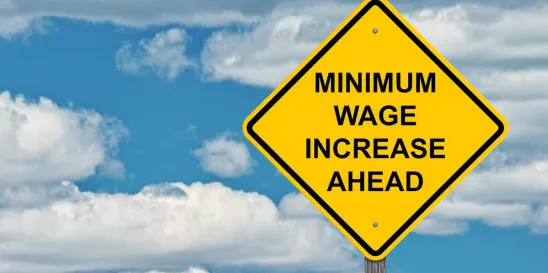With California’s new $20-per-hour minimum wage for fast food workers set to take effect on April 1, 2024, the California Department of Industrial Relations (DIR) has updated its guidance regarding the new minimum wage law’s impact on exempt managers and which employers and employees are covered. The move comes as Governor Gavin Newsom signed a law adding exemptions to the fast food minimum wage for airports, sports stadiums, and other venues.
Quick Hits
- The California Department of Industrial Relations has published guidance regarding the state law increasing the minimum wage for fast food workers that more specifically defines fast food restaurants.
- The state has published an updated minimum wage poster that covered employers must post in the workplace.
- Exempt managers of covered fast food restaurants must receive a minimum salary of $83,200 in 2024.
The DIR has released new guidance in the form of frequently asked questions (FAQs) clarifying aspects of Assembly Bill (AB) 1228 that have caused some confusion for employers. AB 1228, which was signed in September 2024, sets a new $20-per-hour minimum wage for fast food workers and created the so-called Fast Food Council, which will adjust the hourly minimum wage each year through 2029.
The guidance does not have the force of law or regulation; rather it is the agency’s interpretation of the law. Nevertheless, employers may want to take the agency’s opinions into account.
Covered Employers
Fast Food Restaurants
The guidance clarifies the definition of “fast food restaurant” under AB 1228. To be considered a “fast food restaurant,” the employer must meet all three of the following criteria.
The employer must be:
- a “limited-service restaurant” in California, meaning a restaurant that does not offer table service or only limited table services and where customers pay for their food before it is eaten;
- a single restaurant location that is one of a chain of at least sixty establishments nationwide, not including administrative centers, warehouses, or food preparation centers; and
- “primarily engaged in selling food and beverages” to be consumed immediately or immediately when customers return home with their orders as opposed to food that must be “baked, cooked, or heated at home.”
The DIR states that the law applies to fast food employers that are either the entity that owns the national brand or franchises or licensees of the national brand.
The guidance further clarifies that fast-food restaurants will still be covered by AB 1228 even if they sell items that are meant to be baked, cooked, or heated elsewhere, if the restaurant is still “primarily engaged in, meaning it earns more than 50% of its gross income from, selling food or beverage items that are for immediate consumption.”
The guidance further suggests that shops selling ice cream, coffee, boba tea, pretzels or donuts may be considered fast food restaurants if the criterial above are met. The guidance states that “[t]he definition of ‘fast food restaurant’ does not depend on what type of food or beverage an establishment sells.”
Key Exemptions
The DIR guidance highlights the two key exemptions to AB 1228: the bakery exemption and the grocery exemption. The bakery exemption applies to establishments that as of September 15, 2023, “operate a bakery that ‘produces’ and sells ‘bread’ as a stand-alone menu item.”
The guidance states that restaurants do not qualify for the bakery exemption if they only sell bread as part of a sandwich or hamburger and not as a stand-alone item, they sell small stand-alone baked goods “weighing less than one-half pound after cooling” (e.g., muffins, croissants, scones, rolls, or buns), or they “do not ‘produce’ bread on the premises of the restaurant location.”
Further, the guidance clarifies the exemption for fast-food restaurants located inside a “grocery establishment,” which are defined as retail stores that:
- are over 15,000 square feet
- sell primarily groceries for consumption offsite,
- sell other items only secondarily to the groceries,
- earn more than 50 percent of their gross income from the sale of groceries, and
- employ the workers at the workers at the restaurant inside the establishment.
Covered Employees
According to the guidance, it is possible for two employees employed by the same fast-food restaurant chain at different locations for one to be covered by AB 1228 and entitled to the $20-per-hour minimum wage, while the other is not.
The guidance points to such an example involving the bakery exemption where two employees work for the same fast food chain that sells bread as a stand-alone menu item but one works at a location that does not actually produce the bread on-site.
In such a situation, the guidance states that the employee at the location that does not produce bread on-site would be entitled to the new $20-per-hour minimum wage because the employee’s location would not be exempt, but the employee at the other location where bread items are produced on-site would not be entitled to the higher minimum wage because that location would be exempt.
Minimum Salary for Exempt Managers
The guidance spells out that AB 1228’s higher minimum wage for fast food employees will also impact managers who are paid a salary and are considered to be exempt employees for minimum wage purposes. Under California law, to be considered an “exempt employee” for wage and hour purposes, the employee “must receive a salary of at least two times the state minimum wage for someone working 40 hours a week and meet other specific requirements.” (Emphasis in the original.) That means with AB 1228’s increase to the minimum wage for fast food workers, managers at fast food restaurants must make a salary of at least $83,200 per year starting on April 1, 2024, to continue to be exempt.
Wage Poster
The guidance states that covered employers must post a supplemental minimum wage poster in the workplace. The poster can be downloaded here.
AB 610
On March 25, 2024, Governor Gavin Newsom signed AB 610 to exempt “[r]estaurants that are operated in conjunction” with venues that rely on a “captive customer base” from the rising minimum wage. AB 610 adds eight new exemptions from the definition of “fast food restaurant” for establishments that are classified as an: “airport,” “hotel,” “event center” (including sports stadiums and arenas and concert halls), “theme park,” “public or private museum,” and a “gambling establishment,” in addition to restaurants that serve a particular business campus and establishments located on state, county, or city land.
Next Steps
Restaurant employers in California may want to review whether they may be covered by the law and may want to consider steps to prepare for the increased minimum wage taking effect on April 1. California law is quickly evolving in this space and further amendments, carve-outs, or exemptions could be on the horizon, in addition to new guidance on the exemptions added by AB 610.





 />i
/>i
